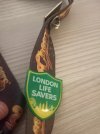Blue Maverick
Well-Known Member
- Joined
- 6 Aug 2010
- Messages
- 25,253
Just watching BBC with Muamba and a few other footballers have been saved by CPR, I’d urge anyone if they get the chance to do even a 20/30 min course, that’s all it takes to learn, if you witness it jumping on straight away will give them a huge chance of survival. Don’t worry you cannot do any harm, they are dead already! You will if done properly hear the cracking of ribs and sternum, don’t worry this is natural. It’s all about confidence, you will be knackered doing it believe me, even 2 mins it’s exhausting, but keep going.

